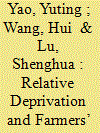| Srl | Item |
| 1 |
ID:
181880


|
|
|
|
|
| Summary/Abstract |
Land expropriation is a common source of grievances and resistance from farmers in China. Based on survey data, we propose that farmers’ sense of relative deprivation is one of the causes. Our study focuses on compensation distribution in villages, where village collectives are the reference for comparison. Relative deprivation is measured by the ratio of farmer compensation to the standard government compensation; the gap between these is roughly the compensation retained by village collectives. The outcome variable is farmers’ willingness to participate in village governance. The empirical test is based on 2017 data from the Chinese Family Database of Zhejiang University and compensation standards data collected by the authors. Nearly 75% of respondents received less than standard compensation, which indicates widespread relative deprivation. And the greater the relative deprivation of farmers, the more willing they are to participate in village governance.
|
|
|
|
|
|
|
|
|
|
|
|
|
|
|
|
| 2 |
ID:
186943


|
|
|
|
|
| Summary/Abstract |
Land expropriation, where peasants’ property rights are encroached by the state, has been recognized as a primary source of social dissension in rural China. Since the end of the last century, the Administrative Litigation Law (ALL) has provided people with a legal weapon to defend themselves against violations by state power. Drawing on the theory of relative deprivation, this paper proposes that peasants are more likely to sue the state when they feel deprived. To examine this hypothesis, we first present a case study to depict the causal process and then use quantitative research to improve the external validity of our findings. We created a novel and unique database of prefecture-level administrative litigations and relative deprivation for Poisson regression analysis. The quantitative results prove that the more peasants feel relatively deprived, the more likely they are to sue the state. Furthermore, the positive effect of relative deprivation on administrative litigations has become more significant over time, implying peasants’ growing awareness of legal resistance. This paper concludes that a critical step towards eliminating social inequity and maintaining social stability in rural China is to reduce the relative deprivation of peasants by, for example, allowing them to share in land value appreciation in the process of urbanization.
|
|
|
|
|
|
|
|
|
|
|
|
|
|
|
|